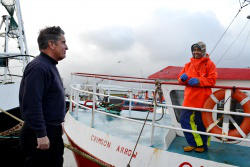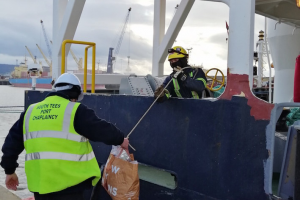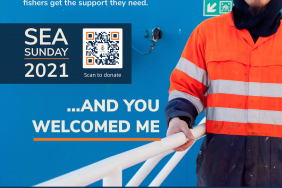Forced labour in shipping and fishing industries still an issue

Delegates at a Vatican conference this week heard that forced labour in the maritime world is still commonplace. Contrary to the popular view, it is not restricted to developing countries but also occurring in countries such as New Zealand, Russia, Turkey, South Korea, Ireland and Scotland.
Fr Giacomo Martino, consultor to the Pontifical Council for Migrants and Itinerant Workers, highlighted industrial fishing vessels as a particular area of concern. "Crew on fishing vessels permanently based on the high seas are unlikely to report abuse, injury or death or otherwise seek help for their own protection" said Martino.
"Fishermen often have to surrender identity documentation to their Master so mobility in port is restricted, their isolation is further compounded by the difficulty or lack of communication with family whilst at sea due to the lack of access to mobile or satellite phones."
Martino, a former port chaplain and former Italian national director of global seafarers’ charity Apostleship of the Sea, said a further factor contributing to the vulnerability of these people is the irregularity of their salary, together with a lack of transparency, and the fact that often the workers are paid literally with a share of the catch, which encourages them to work excessive hours.
The conference heard that fishers are particularly susceptible to exploitation by certain ship owners, brokers and recruitment agencies because of a background of poverty, inexperience and a degree of naivety amongst some migrant workers.
Martino also lamented the lack of significant progress since the publication in 2001 of 'Ships, Slaves and Competition' by Peter Morris. This report stated that 10-15% of global seafarers work in conditions of modern slavery. The report also detailed accounts of seafarers disappearing after arguments with officials or the existence of black lists for those who joined trade unions.
Beyond the fishing sector, Martino highlighted the issue of some owners operating vessels with the minimum number of crew and the fragmentation of national groups, which increased seafarers’ sense of isolation. Additional problems such as lack of health care and social insurance mean that, in reality, the life of a seafarer is far from the romantic idea of a life of adventure in distant lands.
Martino told delegates of his hope that the Maritime Labour Convention, which comes into force in August this year, will establish minimum standards regarding social security, conditions of employment and welfare conditions on board.
The Vatican conference also heard of the continuing phenomenon of piracy, particularly in Somalia, in which hundreds of ships, and thousands of seafarers, have been systematically attacked, taken, and brutalized; with many seafarers kidnapped for several months in atrocious conditions without food and adequate water, sometimes being physically and psychologically tortured.
Martino told the conference that unlike others areas of forced migration, seafarers and fishers do not appear as a true "migration issue" because they do not physically have the time to "bother us”. They are “like ghosts touching our cities daily, emerging from ships for the procedure of signing in, or for a quick phone call home, to disappear immediately inside the metal sheets like cockroaches struck by light; always strangers in every port."
Following the intervention of Martino, delegates today met Pope Francis who invited the whole international community, to develop, “effective initiatives and new approaches in order to protect their dignity.”
For more information, see: www.apostleshipofthesea.org.uk


















